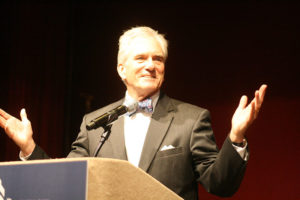Six months away from retirement, Baptist Joint Committee for Religious Liberty head Brent Walker reflected on 27 years of “seeking both/and solutions in the congested intersection of church and state” at an annual lunch gathering for BJC supporters June 24 during the Cooperative Baptist Fellowship 2016 General Assembly in Greensboro, N.C.
Stating he didn’t want his address to a crowd of 750 to sound like a “eulogy,” Walker acknowledged it would probably be his last time to appear before the Religious Liberty Council — the Baptist Joint Committee’s individual membership organization — until after his successor is named.
Citing fidelity to the Baptist belief “that soul freedom is a God-breathed gift to all humankind,” Walker reviewed a litany of “yes/no” approaches to resolving tension between the First Amendment’s establishment and free-exercise clauses illustrating the agency’s conviction that the government should protect religion without promoting it.
“The BJC says yes to voluntary student prayer but no to prayers delivered in a public school classroom by a teacher,” Walker said. “We say yes to tax exemption for religious and other nonprofits but no to subsidies for churches to support their ministry. We say yes to moments of silence in public gatherings but no to government-sponsored religious exercises like official prayers at city council meetings.”
“We continue to say yes to the federal Religious Freedom Restoration Act that the Baptist Joint Committee and others so carefully crafted 23 years ago but no to bastardized versions seen in many state RFRAs over the past couple of years,” Walker said. “We say yes to a generous exemption for the cause of conscience for religiously affiliated nonprofits that oppose forms of contraception but no to ways that disallow insurance coverage for opting-in employees.”
“We say yes to government’s ability to guard civil rights of all citizens, including our LGBTQ friends, while respecting the autonomy of houses of worship to govern their own affairs differently,” Walker said.
Walker, who worked as BJC associate general counsel and general counsel before being named executive director in 1999, described the opportunity as “the pinnacle of my professional life.”
It wasn’t all work and no play, he admitted, sharing “rare opportunities to do real bucket list type of stuff.”
“I’ve had significant and substantive time with four American presidents, meeting twice in the Oval Office,” Walker reflected. “I’ve personally met eight Supreme Court justices and had the opportunity to work with Elena Kagan back when she was a junior lawyer in the White House counsel’s office. Along with Holly [BJC General Counsel Holly Hollman] I attended a meeting on Capitol Hill with Bono.”
Walker recalled sitting beside Alabama Chief Justice Roy Moore “and having him call me on the record a hypocritical Baptist pastor, because I objected to Roy’s Rock with his version of the Ten Commandments on it.”
Walker recalled attending one State of the Union address and standing in line with Sen. Jack Reed of Rhode Island and “after introducing myself and mentioning the Baptist Joint Committee hearing him say, ‘Ah, you mean the Roger Williams-kind of Baptist.’”
Most “poignantly and tragically,” Walker reminisced about “looking out my office window with the staff watching the smoke waft up from the horizon as the Pentagon burned on that awful September morning, fearing the Capitol dome two blocks away might be next.”
“We prayed and we all went home,” Walker said.
Previous stories:
Son of executed woman says no one has the right to say someone cannot change
Judge criticizes secrecy in U.S. executions
CBF General Assembly spawns two statements condemning Orlando massacre
CBF adopts new model for funding field personnel
Black pastor urges CBF to partner with institutions in the ‘hood’
Pastor says being black a ‘burdensome joy’
Historian says it’s ‘too late in the denominational game’ for segregated ministry

